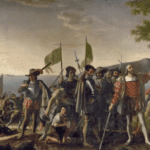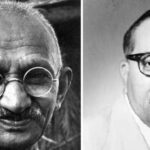The colonization of what is now the United States began in the late 15th and early 16th centuries with the arrival of European explorers and settlers. Here are the key phases and factors involved in the beginning of this process:
Early Exploration and Claims
- Spanish Exploration and Colonization
- Christopher Columbus: Columbus’s voyages, starting in 1492, marked the beginning of European exploration in the Americas. Though he never reached the mainland United States, his expeditions paved the way for further Spanish exploration.
- Conquistadors: Spanish explorers such as Juan Ponce de León, who landed in Florida in 1513, and Hernando de Soto, who explored the southeastern United States in the 1540s, established early claims and settlements. The Spanish established St. Augustine in Florida in 1565, the oldest continuous European settlement in the continental U.S. (WeGarhwali) (Amrit Mahotsav Govt).
- French Exploration
- Jacques Cartier: Cartier’s expeditions in the 1530s and 1540s explored the St. Lawrence River and laid the foundation for French claims in North America.
- Samuel de Champlain: Champlain founded Quebec in 1608 and explored the Great Lakes and the northeastern U.S. regions, establishing French influence in these areas.
- English Colonization
- Roanoke Colony: Sir Walter Raleigh established the first English colony at Roanoke Island (present-day North Carolina) in 1585, which mysteriously disappeared.
- Jamestown: The Virginia Company established Jamestown in 1607, the first permanent English settlement in North America. This colony faced significant hardships, including conflicts with indigenous peoples, disease, and starvation, but it eventually succeeded due to tobacco cultivation and strong leadership.
Motivations for Colonization
- Economic Interests: European powers were driven by the search for new trade routes, wealth (especially gold and silver), and new resources. The promise of land and economic opportunities attracted many settlers.
- Religious Freedom: Many settlers sought religious freedom, including the Pilgrims who established Plymouth Colony in 1620 and the Puritans who settled in Massachusetts Bay in 1630.
- Geopolitical Competition: European nations sought to expand their empires and compete with each other for global dominance. Establishing colonies was a way to claim territory and resources before rival nations.
Early Settlements and Growth
- New England Colonies
- Plymouth Colony: Founded by the Pilgrims in 1620, Plymouth faced a harsh first winter but ultimately survived with assistance from local Native American tribes.
- Massachusetts Bay Colony: Established in 1630 by Puritans led by John Winthrop, this colony grew rapidly and became a center for trade, education, and Puritan religious practices.
- Middle Colonies
- New Amsterdam: The Dutch established New Amsterdam (later New York City) in 1624 as a trading post. The English took control in 1664, renaming it New York.
- Pennsylvania: Founded by William Penn in 1681 as a haven for Quakers, it became known for its religious tolerance and diverse population.
- Southern Colonies
- Virginia: Tobacco farming became the economic backbone of Virginia, leading to the importation of indentured servants and later African slaves.
- Maryland: Founded in 1632 as a haven for Catholics, Maryland also became a tobacco-producing colony.
Indigenous Interactions and Conflicts
- Native American Relations: Early settlers often relied on assistance from indigenous tribes for survival, but relations varied from cooperation and trade to violent conflict and displacement. European diseases devastated native populations, significantly impacting their societies.
- Conflicts: Various conflicts arose, such as King Philip’s War (1675-1678) in New England, which was one of the bloodiest conflicts between colonists and Native Americans.
Legacy and Impact
The early colonization efforts set the stage for the development of the Thirteen Colonies, which would later unite and seek independence from British rule. These initial settlements brought profound changes to the land and its people, laying the groundwork for the complex history of the United States.
Conflict and Consolidation
- The European powers often clashed over territorial claims. The French and Indian War (1754-1763) was a significant conflict that resulted in the British gaining control of French territories in North America.
- The diverse colonial experiences set the stage for the eventual unification of the colonies and the quest for independence from British rule.




